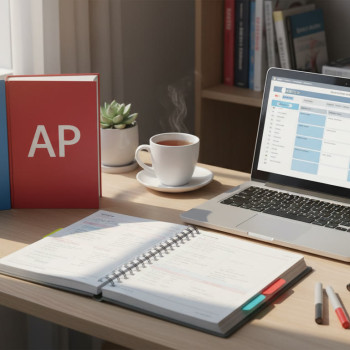Coaching vs Self-Study: Which AP Approach Gives the Best ROI for Each Subject?
If your child is gearing up for AP exams, you’ve probably faced the same tension almost every parent I talk to: should they sign up for coaching (tutors, classes, test-prep programs) or trust a disciplined self-study plan? The answer isn’t one-size-fits-all. It depends on the subject, the student’s learning style, time availability, and—critically—the return on investment (ROI) you want: higher score, college credit, scholarship edge, or stronger habits for college-level work.
Why ROI matters (and what ROI means for APs)
ROI here isn’t purely monetary. For AP exams, ROI combines several outcomes: exam score improvement, time spent, stress reduction, likelihood of earning college credit, and long-term academic confidence. For some families, a small score gain that translates to a guaranteed college credit is huge. For others, learning independence and cost savings are worth more.
This guide breaks down how coaching vs self-study usually plays out across different AP subjects, so you can choose the option that gives the best mix of outcomes for your child.

How to think about coaching vs self-study
Before we look at subjects, here are five practical lenses to decide which route to take:
- Baseline skills: If your child already has strong foundational knowledge in a subject, self-study can be very efficient. If they’re missing basics, coaching accelerates the catch-up.
- Learning style: Some students thrive with structure and accountability that coaching provides; others are self-motivated and do better with flexible schedules.
- Time until exam: With months to prep, self-study plus occasional check-ins works. With a short runway, focused coaching delivers faster score gains.
- Subject nature: Quantitative, cumulative, or lab-based subjects often benefit more from guided instruction than purely reading-and-memorization subjects.
- Cost vs outcome: Consider both money and time. Coaching costs more but can pay back through higher scores, scholarships, or placement. Self-study costs less but requires parental time or strong teen discipline.
Subject-by-subject ROI analysis
Below I walk through common AP subjects and recommend whether coaching, self-study, or a hybrid is likely the highest ROI for most students. I include practical tips and a quick guide to what to watch for.
AP Calculus AB/BC
Nature of the course: Sequential, conceptual, and problem-solving heavy. Success requires mastery of prerequisites (algebra, trig, pre-calc) and fluent practice.
Best ROI: Coaching (or hybrid) for students who aren’t consistently strong in math. Self-study for high-achieving, discipline-driven students who already excel in math.
- Why coaching helps: An experienced coach spots specific misconceptions (e.g., limits vs. continuity, improper integration techniques), provides targeted practice, and teaches efficient problem strategies under time pressure.
- If self-studying: Focus on structured problem sets, timed mock exams, and reviewing solutions carefully. Supplement with occasional expert sessions to check technique and timing.
AP Physics (1, 2, C)
Nature of the course: Conceptual understanding, lab reasoning, and (for C) calculus-based problem solving.
Best ROI: Coaching for Physics C and students who struggle with translating word problems into equations. Self-study can work for Physics 1 or 2 if the student is upbeat about hands-on experiments and has access to good resources.
- Why coaching helps: Physics rewards guided problem-solving frameworks and lab-report logic. Coaches can simulate lab analysis, clarify vector reasoning, and refine problem translation skills.
- Self-study tips: Build a lab notebook, practice free-response problems, and prioritize conceptual questions before algebraic manipulations.
AP Biology and AP Chemistry
Nature of the courses: Heavy content volume, vocabulary, and lab-based reasoning.
Best ROI: Hybrid approach. Self-study for motivated students with strong reading skills; coaching for students who struggle with retention, lab skills, or timed free-response sections.
- Why a hybrid works: These subjects require memorization and pattern recognition (student can self-study those) plus strategic lab and free-response techniques (where coaching adds most value).
- Self-study strategies: Active recall (flashcards), spaced repetition, and teaching back tough concepts aloud. Use periodic coached sessions to model FRQ structure and lab analysis.
AP English Language and Composition / AP English Literature
Nature of the courses: Reading comprehension, argumentation, writing craft, and timed essays.
Best ROI: Hybrid (mostly self-study with targeted coaching). Writing improves most from feedback—one-on-one coaching that provides critique and revision guidance yields high ROI.
- Why coaching helps: Tutors give actionable feedback on thesis clarity, evidence use, and time management in essays. They also help with rhetorical analysis techniques that are hard to self-evaluate.
- If self-studying: Have your teen write timed essays regularly and get them critiqued by a teacher or peer group if not a paid tutor.
AP Computer Science A
Nature of the course: Hands-on coding, logic, and fluency in programming constructs.
Best ROI: Coaching for beginners; self-study for students who already code or learn quickly from online projects.
- Why coaching helps: Debugging skills and translating algorithms into code are often faster to teach in real time. Coaches can also recommend efficient project practice and testing strategies.
- Self-study tips: Build small projects, practice past exam coding problems, and simulate timed coding with strict environments.
AP US History (APUSH), AP World History, AP Government
Nature of the courses: Big-picture understanding, narrative building, and evidence synthesis. Heavy on reading and writing.
Best ROI: Self-study supplemented by coaching focused on essays and DBQ/LEQ techniques. History rewards disciplined reading, timeline creation, and frequent practice essays.
- Why coaching helps: Coaches can model DBQ/LEQ structures and give brisk feedback on using documents as evidence rather than summary.
- Self-study tips: Use timelines, connect causes to consequences, and practice turning content knowledge into argumentative paragraphs under time limits.
AP Statistics
Nature of the course: Conceptual and application-oriented; understanding when and how to use statistical tools.
Best ROI: Mixed. Many students succeed with self-study if they practice interpreting real data; coaching helps refine inference logic and exam strategies.
- Why coaching helps: Tutors can demonstrate how to read results, select tests, and avoid common pitfalls in interpretation questions.
- Self-study tips: Work through varied datasets, understand conditions for tests, and simulate calculator-dependent sections.
Cost-effective models: How hybrid approaches optimize ROI
One common thread across high-ROI plans is hybridization: mostly self-study with periodic coaching where it moves the needle most. Here are models that families use effectively:
- Monthly check-in model: Weekly self-study + one 60–90 minute tutor session per month to audit progress and fix misconceptions.
- Bootcamp model: Intensive coaching in the 6–8 weeks before the exam to shore up weaknesses, after months of self-study. This often yields big score jumps for a limited cost.
- Targeted-skill model: For students who only need help with essays, time management, or problem types (e.g., free response), spend coaching resources only on those skills.
Quick decision checklist for parents
Ask these five short questions to decide which path is right this season:
- Does my child already score above a 4 on practice exams? If yes, self-study with light coaching may be enough.
- Are there clear knowledge gaps (algebra for calculus, labs for sciences)? If yes, coaching accelerates gains.
- How many months until the exam? Less time increases coaching ROI.
- What score do we need (college credit vs. boost to GPA)? Higher stakes justify more coaching.
- Does my teen respond poorly to unstructured work? If yes, coaching gives accountability and routine.
Sample study budgets and expected ROI
Below is a simple table showing typical time/cost investments and rough outcomes for average students choosing self-study, hybrid, or full coaching over a 4–6 month prep window. Numbers are illustrative averages to help planning, not guarantees.
| Approach | Estimated Cost | Weekly Time | Typical Score Gain | Best For |
|---|---|---|---|---|
| Self-Study | Low (books, apps) | 6–10 hrs | 0–1 points | Disciplined, high baseline students |
| Hybrid (Monthly Coaching) | Moderate | 6–10 hrs + 1 session/mo | 1–2 points | Students needing targeted feedback |
| Full Coaching | High | 8–12 hrs + weekly sessions | 2–3+ points | Low baseline or high-stakes targets |
Practical tips to maximize ROI no matter the path
Whether you choose self-study, coaching, or both, these practices multiply your returns.
- Use real past exams: Practice under timed conditions with official questions. That familiarity is non-negotiable for ROI.
- Track progress with metrics: Record scores, error types, and time per question. Treat prep like a project—measure, iterate, improve.
- Prioritize high-yield weaknesses: One recurring mistake corrected can save many points.
- Simulate exam-day conditions: Full-length practice tests build stamina and reveal pacing problems.
- Balance depth and breadth: For content-heavy subjects, allocate weekly cycles to both review and timed practice.
Where tutoring like Sparkl fits naturally
Personalized tutoring (for example, Sparkl’s 1-on-1 guidance) shines when used strategically: occasional expert audits, targeted essay feedback, or intensive short-term bootcamps. Sparkl’s tailored study plans and expert tutors can translate a nebulous study plan into a concrete pathway—particularly helpful for students who need clear, efficient steps to improve in key areas. If you’re considering coaching, pick a program that can adapt to your child (not a fixed curriculum) and offers data-backed insights to focus sessions efficiently.

Case studies (realistic scenarios)
These condensed examples show how different students might approach prep.
- Case A — The Busy Overachiever: Already scores 4s in practice for Calculus AB but wants a 5. Chooses self-study with strict weekly timed tests and two Sparkl coaching check-ins before the exam to polish problem strategies. ROI: small time and money, high probability of achieving the target.
- Case B — The Catch-Up Candidate: Struggles with algebra foundations and aiming for AP Calculus BC. Chooses weekly coaching with a focus on pre-calc gaps plus daily practice. ROI: higher upfront cost but significant score improvement and confidence gains.
- Case C — The Writer Who Needs Feedback: Strong content knowledge in AP English Literature but weak at timed essays. Chooses self-study for reading and weekly coaching for essay feedback, revision cycles, and pacing. ROI: high — essay scores typically improve quickly with targeted critique.
How to pick a tutor or program (if you go coaching)
Not all coaching is equal. Here’s a checklist to find high-ROI tutors or services:
- Experience with the specific AP exam and rubric.
- Ability to provide sample lesson plans and measurable progress markers.
- Flexible scheduling and targeted sessions (not only hour-long lectures).
- Evidence of past student outcomes or testimonials (qualitative is fine).
- Compatibility with your child’s personality—rapport matters hugely.
Wrapping up: a practical path forward for parents
There’s no single right answer. For many families, the highest ROI is found by combining disciplined self-study with targeted coaching where it moves the needle most: math problem-solving, lab reasoning, timed essays, and debugging code. Start with a baseline—have your child take a timed practice test—and then choose an approach based on the gap to the target score, the time available, and the student’s learning style.
If you’re leaning toward coaching but want to be efficient, consider programs that offer personalized 1-on-1 guidance and tailored study plans so every session is directly relevant to the student’s current gaps. Small, well-timed investments in expert feedback can produce disproportionately large improvements in AP scores, confidence, and readiness for college-level work.
Above all, keep communication open with your teen. The best ROI isn’t just a higher AP score—it’s a less stressful process, sharper study skills, and a clearer path to the next academic milestone.
Quick action checklist (for today)
- Schedule one timed practice test for each AP subject your child is taking.
- Identify the top two recurring error types (content gap vs. pacing vs. strategy).
- Decide on an approach: Self-Study, Hybrid, or Full Coaching—based on the checklist above.
- If choosing coaching, book an initial diagnostic session with a tutor who can provide a tailored plan.
- Set short milestones: mini-goals every two weeks to keep momentum and measure ROI.
Good luck—your thoughtful planning and steady support will make a real difference. If you’d like, I can help you draft a personalized 3-month study schedule based on your child’s subject list, current practice scores, and weekly availability.



















No Comments
Leave a comment Cancel